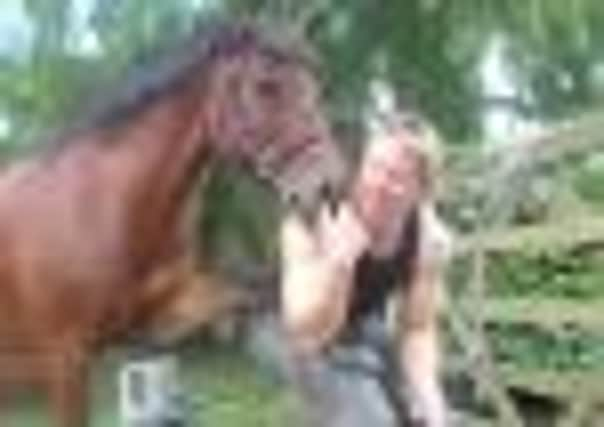Showcase for craft of skill and science


Daniel Lowe completed his four-year apprenticeship in 2008 and has built up a healthy business in the area around Huddersfield, Wakefield, Sheffield, Barnsley and Worksop.
Next weekend he will be at the heart of the 140th Penistone Show (Saturday, September 8) organising and commentating on the Farrier Competition aimed at promoting and educating an enthusiastic crowd.
Advertisement
Hide AdAdvertisement
Hide Ad“Many have never seen farriery in action before. We explain what’s happening during the process of shoeing and there is a great deal of interest. I hope that horse owners see that we don’t just shoe horses and that’s it. We put a lot of time and effort into what we do. It is all about the mix between the blacksmith’s craft and the farrier’s science. That’s what sets our trade apart.
“The skill in making shoes is essential, but the role of the farrier is also in understanding the anatomy and physiology of a horse. It was the combination of these two disciplines that pulled me in. The job is much more interesting than it might first seem when you see shoes being fitted. Our main studies are the hock and below in the back feet; and the knee and below in the front feet.
“We have to know the blood vessels, veins, arteries, nerves, bones, ligaments and tendons. The feet and shoes are like the foundations of a horse. If they’re not right then the rest of the horse won’t be right either.”
Daniel’s interest in a career in farriery came about through a process of completing his A-level studies, realising he had wasted two years since his GCSEs, then taking stock while labouring for a local builder and thinking about what really interested him.
Advertisement
Hide AdAdvertisement
Hide Ad“I started looking at engineering then I turned to blacksmithing. I’d always had an interest through watching farriers at agricultural shows or when I had visited Beamish Museum, or when I had seen them in action on television, so I decided to pursue it.”
Having started out with a blacksmith who produced all manner of metalwork including upmarket interior lighting, Daniel decided on farriery.
“I contacted a local farrier, Tom Pears. I went out with him for just a day and I got the bug. The die was cast. I became apprentice to Ged Hallam in Lincolnshire and he set me on my way.”
Daniel’s business now sees him working at least six days a week, but he’s on call 24/7. He explains that due to farriers’ knowledge of horses they are often seen as part shoemaker and fitter and part foot vet.
Advertisement
Hide AdAdvertisement
Hide Ad“If there’s an emergency you’ve got to be there. The horse could have a twisted shoe and it could cause problems. Usually if it’s just a shoe that’s been pulled off they are okay but I still try to get out within 24 hours. For anything foot related I always encourage the owner to get me out first. If we subsequently need a vet then we can get them in, but if the problem can be solved through me then so much the better.”
Amongst his regular customers are Chris Morgan, ex-captain of Sheffield United; the owners of Sheffield Steelers ice hockey team; and eventer Amy Hawley who recently won gold at a European junior event.
Four years ago Daniel started the Farrier Competition at Penistone Show. Its popularity has been such that he has now become one of the show’s organising committee and will take a couple of days out from his business in the lead up to next weekend’s show to help prepare.
“I’ve always come to the show from being very young. It was and still is the big event around here. Our Farrier Competition is only small in comparison to the likes of the Great Yorkshire Show but it has quickly become another strong part of what we do here.
Advertisement
Hide AdAdvertisement
Hide Ad“We will have three classes this year. They include an open class for qualified farriers and two classes for apprentices. I’m hoping we will have four horses available. The qualified farriers are allocated one foot each in the competition and will be putting on a concave shoe. It’s the type of shoe we all put on every day. The second part of the competition is to forge a shoe that matches the judge’s own specimen shoe. That’s all down to their forging skills.’
“The apprentices have to make a pair of shoes in an allotted time. The first and second year apprentices will be making pony shoes this year.
“To some that may seem quite simple but the time they are allotted makes it more of a challenge whilemaintaining quality.
“The third and fourth year apprentices will be making a pair of shoes for a driving horse. They will involve quite a thick section of steel that will require a lot of forging. Once again all of these shoes will be judged based upon being as close to the judge’s specimen.”
Penistone Show takes place Saturday, September 8.